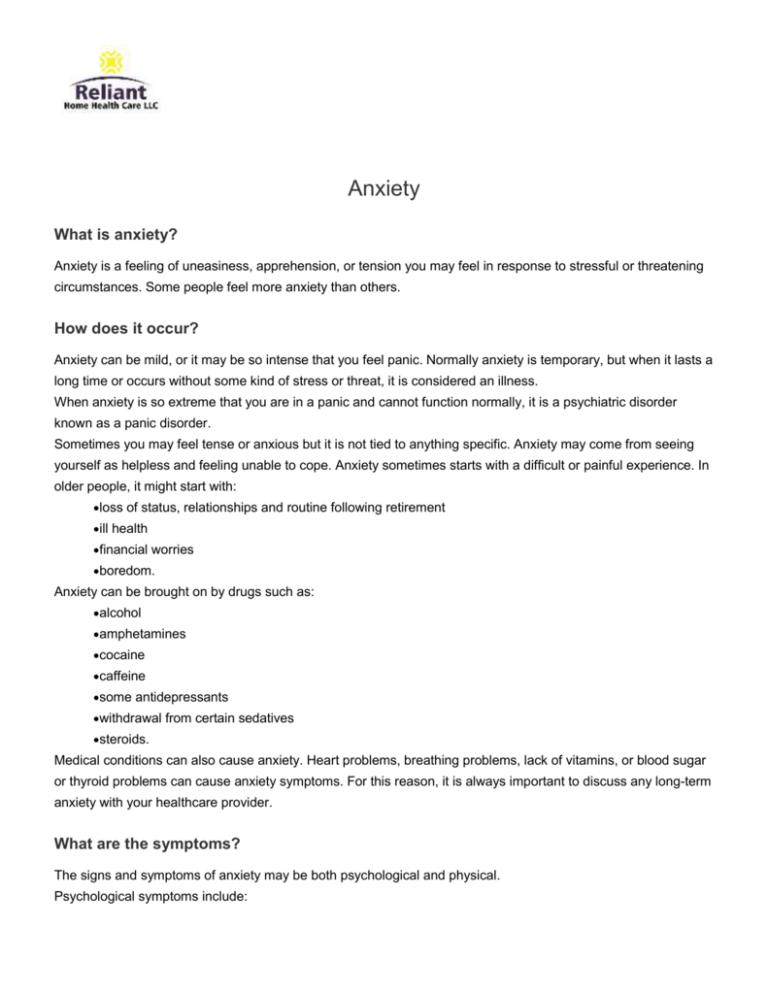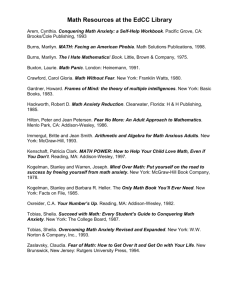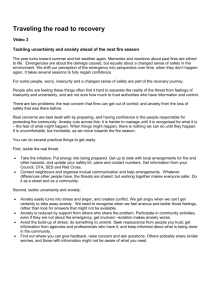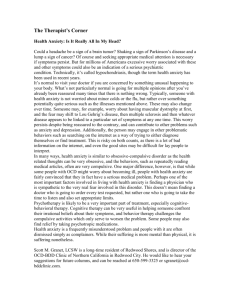
Anxiety
What is anxiety?
Anxiety is a feeling of uneasiness, apprehension, or tension you may feel in response to stressful or threatening
circumstances. Some people feel more anxiety than others.
How does it occur?
Anxiety can be mild, or it may be so intense that you feel panic. Normally anxiety is temporary, but when it lasts a
long time or occurs without some kind of stress or threat, it is considered an illness.
When anxiety is so extreme that you are in a panic and cannot function normally, it is a psychiatric disorder
known as a panic disorder.
Sometimes you may feel tense or anxious but it is not tied to anything specific. Anxiety may come from seeing
yourself as helpless and feeling unable to cope. Anxiety sometimes starts with a difficult or painful experience. In
older people, it might start with:
loss of status, relationships and routine following retirement
ill health
financial worries
boredom.
Anxiety can be brought on by drugs such as:
alcohol
amphetamines
cocaine
caffeine
some antidepressants
withdrawal from certain sedatives
steroids.
Medical conditions can also cause anxiety. Heart problems, breathing problems, lack of vitamins, or blood sugar
or thyroid problems can cause anxiety symptoms. For this reason, it is always important to discuss any long-term
anxiety with your healthcare provider.
What are the symptoms?
The signs and symptoms of anxiety may be both psychological and physical.
Psychological symptoms include:
apprehension or fear
feeling cranky or irritable
panic
impatience
feeling of imminent danger
feeling restless or unable to relax
trouble concentrating
trouble sleeping
lack of enjoyment.
Physical signs and symptoms include:
dry mouth or feeling like you are choking
flushing
nausea or vomiting
feeling faint, lightheaded, or shaky
diarrhea
constipation
muscle tension
frequent urination
hyperactivity
sexual difficulties
rapid or irregular heartbeat
hyperventilating or feeling short of breath
sweating, especially in the palms.
How is it diagnosed?
Your healthcare provider will ask about your symptoms. He or she will ask you about life events, daily activities,
and your view of how things are going.
Your healthcare provider will also examine you. Lab tests may be done to rule out a physical problem as the
reason for your anxiety. Possible tests include a blood tests, thyroid function tests, and urine tests.
How is it treated?
You and your healthcare provider will discuss your symptoms. Then he or she will suggest ways to help you deal
with anxiety. Your provider may refer you to a specialist such as a psychiatrist or psychotherapist. Relaxation
therapy, imaging, biofeedback, stress management techniques, and other forms of therapy may be useful.
If your anxiety is severe or causing panic, your healthcare provider may prescribe a medicine to help you cope
with the symptoms. Several medicines can help treat anxiety. Your healthcare provider will work with you to
carefully select the best one for you.
To decrease anxiety, it is important to identify and use methods that relieve your symptoms. Your healthcare
provider may want to see you regularly if your anxiety attacks include physical symptoms.
How can I take care of myself?
Increase your awareness of how anxiety and stress affect you and learn which coping methods work for you.
Also, get enough rest, exercise, and learn to use relaxation techniques. Talk with your healthcare provider or
therapist about managing events in your life that trigger anxiety. In addition, make an effort to talk with friends
and coworkers about the normal stresses of daily life.
What can I do to help prevent anxiety?
Anxiety may occur when life's demands are greater than your ability to cope with them. Therefore, prevention
means improving your coping skills or modifying the demands and expectations in your life. To prevent anxiety,
try these suggestions:
Exercise for at least 20 minutes every day. For example, take a brisk walk.
Learn which activities make you feel better and do them often.
Talk to your family and friends.
Eat a healthy diet.
Avoid caffeine.
Get 7 to 9 hours of sleep per night.
Keep a regular schedule for going to sleep and getting up.
Avoid using alcohol or drugs.
Learn relaxation techniques or yoga.
© 2008 RelayHealth and/or its affiliates. All rights reserved.







